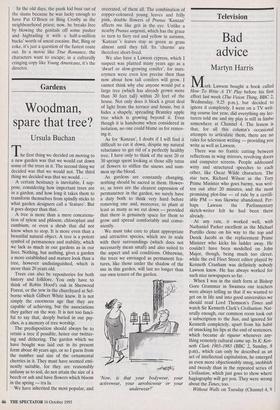Television
Bad advice
Martyn Harris
Mark Lawson bought a book called How To Write A TV Play before his first effort last week (The Vision Thing, BBC 2, Wednesday, 9.25 p.m.), but decided to ignore it completely. I went on a TV writ- ing course last year, did everything my lec- turers told me and my play is still in limbo somewhere at Channel 4. The lesson is that, for all this column's occasional attempts to articulate them, there are no rules for television writing — providing you write as well as Lawson.
There was no frantic cutting between reflections in wing mirrors, revolving doors and computer screens. People addressed witty and structured speeches to each other, like Oscar Wilde characters. The star turn, Richard Wilson as the Tory Prime Minister who goes barmy, was writ- ten out after 20 minutes, and the most promising plot-line — of rule by a certifi- able PM — was likewise abandoned. Per- haps Lawson the Parliamentary sketch-writer felt he had been there already.
At any rate, it worked well, with Nathaniel Parker excellent as the Michael Portillo clone on his way to the top and Derek Jacobi as the replacement Prime Minister who kicks his ladder away. He couldn't have been modelled on John Major, though, being much too clever, while the evil Fleet Street editor played by Kenneth Cranham was definitely nobody Lawson knew. He has always worked for such nice newspapers so far.
When I was in the sixth form at Bishop Gore Grammar in Swansea our teachers were always telling us that if we wanted to get on in life and into good universities we should read Lord Thomson's Times and watch Sir Kenneth Clark's Civilisation. Nat- urally enough, our common room took out a subscription to the Sun, and ignored Sir Kenneth completely, apart from his habit of smacking his lips at the end of sentences, which became de rigueur whenever any- thing remotely cultural came up. In K Ken- neth Clark 1903-1983 (BBC 2, Sunday, 8 p.m)., which can only be described as an act of intellectual capitulation, he emerged as even more objectionably smug, snobbish and tweedy than in the repeated series of Civilisation, which just goes to show where hagiography will get you. They were wrong about the Times, too.
Without Walls on Tuesday (Channel 4, 9 P.m.) featured Germaine Greer in a brave attack on the corrosive cult of youth, cur- rently represented on your screens by such programmes as One Foot in the Grave, Brighton Belles, The Golden Girls, Waiting for God, Earth to Earth, You Might as Well be Dead (I am making them up now, but you know what I mean).
Old Doctor G, formerly of Schoolkids' Oz and dressed for the occasion in an unbecoming school uniform, was only ten years late on this particular bandwagon, whose core is the proposition that we aren't growing old as enthusiastically as Doctor G thinks right.
This is due, apparently, to the first world war, where 'young bodies were sacrificed by old minds' (cue trenches footage, brave- ly grinning Tommies, withering machine- gun fire etc). Thirty minutes later she was blaming youthism not on General Haig but the collapse of the family, when the baby boomers overran and outpaced their par- ents' (I write this down without a clue what it means).
I suppose that Doctor G, being single, wealthy, childless and without experience of raising children or caring for old people, has the same right to lecture us on family values as, say, Stephen Norris, but nothing Can excuse the lazily apocalyptic rant of the programme's closing minutes, as Dr G declaimed: The ultimate reality is a nation of individuals locked into their solitary pleasures without any social role or rele- vance at all . . . Will we have to descend into utter chaos before we remember what youth is for and age is for?' An ultimate reality and an utter chaos in One speech and before bedtime. It's almost worth getting old for.



























































 Previous page
Previous page